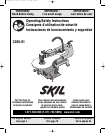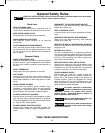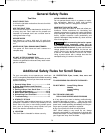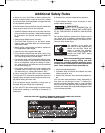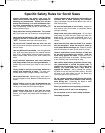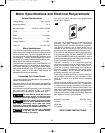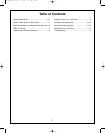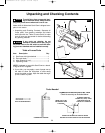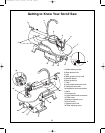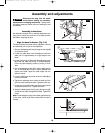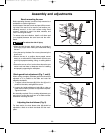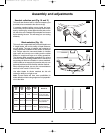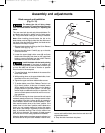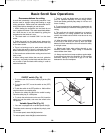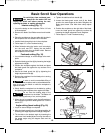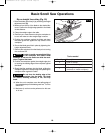
5
.
Specific Safety Rules for Scroll Saws
A
lways disconnect the power cord from the
power source before making any adjustments or
attaching any accessories. Always turn off saw
before disconnecting it to avoid accidental start-
ing when reconnecting to a power source.
You
may unexpectedly cause the tool to start leading to
serious personal injury.
Never leave tool running unattended. Turn power
off. Don't leave tool until it comes to a complete stop.
Never leave the switches in "ON" position. Before
plugging the tool in, check that the switches are
"OFF". Accidental start-ups could cause injury.
Do not use tool if switch does not turn it on and
off. Have broken switches replaced by an authorized
service center.
Use only Skil scroll saw blades. Use the right blade
size, style and cutting speed for the material and the
type of cut. Sharp blades minimize stalling and kick-
backs. Blade teeth should point down toward the
table.
Avoid awkward operations and hand positions
and always make sure you have good balance. A
sudden slip could cause your hand to move into the
blade.
Firmly clamp or bolt your scroll saw station to a
stable, level workbench or table. The most com-
fortable table height is approximately waist height.
Never stand on tool. Serious injury could occur if
the tool is tipped or if the blade is unintentionally con-
tacted.
Before making a cut, be sure all adjustments are
secure.
Loose table or guards could shift in use and
cause you to loose control of the workpiece.
Always adjust drop foot to just clear the work-
piece.
Proper adjustment of the drop foot will help
protect your fingers and keep blade breakage to a
minimum.
A
lways support large workpieces while cutting to
minimize risk of blade pinching and kickback.
Heavy workpiece may cause the table to slip, walk or
slide while cutting.
Be sure the blade path is free of nails. Inspect for
and remove nails from lumber or workpiece before
c
utting or sanding.
Keep hands away from cutting area. Do not hand
hold pieces so small that your fingers go under the
blade guard. Do not reach underneath work or in
blade cutting path with your hands and fingers for any
reason.
Never start the tool when the blade is in contact
with the workpiece. Allow the motor to come up
to full speed before starting a cut. Blade in contact
with the workpiece on start up will cause it to jump.
Observe and follow correct direction of feed and
do not feed the material too quickly. Hold the
work firmly against the table. Feed work into a
blade against the teeth of the blade. Feeding materi-
al too forcefully may cause blade to snap.
Use caution when cutting materials with an irreg-
ular cross-section or rounds like dowel rods. If
possible lay the material on its "flat" side when
cutting. For round stock use a "Vee" block to
support the material. Wavy material like molding
will tend to rock and may bind while cutting. Rounds
will tend to roll while being cut and the blade may
"bite" and grab it from your control.
Do not remove jammed cutoff pieces until blade
has stopped. Never touch blade or other moving
parts during use. Contacting the blade or other
moving mechanism may cause injury.
Wear eye protection and respiratory protection.
Know how to shut off tool in an emergency.
Do not expose to rain or use in damp locations.
Grounding required.
SM 2610957121 05-08 6/5/08 7:35 AM Page 5



